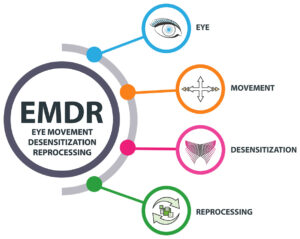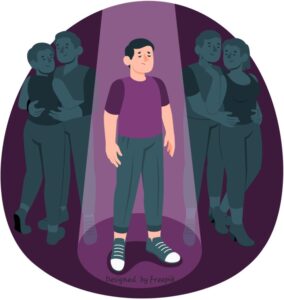“You should really skip that dessert.”
“Aren’t you too young to be this out of shape?”
“If you lost a few pounds, you’d be so much prettier.”
or
“Do you ever eat?”
“You look like a skeleton.”
Do you have an eating disorder?”
These are the kinds of thoughtless, harmful comments that society often directs at adolescents. In a world obsessed with beauty standards and body image, such words pierce deeply, leaving lasting scars. And now in the age of digital transformation, the world has become a global village where trends, fashions, and ideals travel at the speed of light. Amidst this change, beauty norms and standards, which have always existed, have found a new platform: social media. While these platforms connect us, they also carry the insidious power to magnify insecurities, particularly among the most vulnerable members of our society—adolescents.
The relentless pressure to conform to these unrealistic ideals can crush a young person’s spirit, leading them down a dangerous path filled with self-doubt, anxiety, and ultimately, eating disorders, which are serious and can be life-threatening.
Some might start dieting excessively, exercising too much, or even engaging in dangerous habits to try to change their bodies. Anorexia nervosa, characterized by severe food restriction and an intense fear of gaining weight, can cause serious health problems, including heart issues, bone density loss, and severe malnutrition. Bulimia nervosa involves cycles of binge eating followed by purging through vomiting or excessive use of laxatives. Binge-eating disorder, on the other hand, involves consuming large amounts of food in a short period, leading to feelings of guilt and shame.
The impact doesn’t stop there. The constant worry about body image can lead to anxiety, depression, and low self-esteem. Teens might withdraw from friends and family, stop participating in activities they used to enjoy, and even struggle with school. The mental and emotional toll can be devastating.
The first step in combating eating disorders is raising awareness about their existence and impact. Simply labeling someone as obese or thin based on their body type misses the severity of these conditions. Eating disorders are much more serious than they are often perceived to be. Historically, eating disorders were overlooked or misunderstood in India, frequently considered to be primarily “Western phenomena.” However, statistics indicate otherwise, as the prevalence of eating disorders in India is on the rise.
However, there is hope. Eating disorder treatment in India is evolving, with more awareness and resources becoming available. Parents, educators, and healthcare professionals must understand the signs of eating disorders and the importance of early intervention. An adolescent struggling with body image issues and disordered eating behaviors may exhibit symptoms such as drastic weight changes, preoccupation with food and dieting, avoidance of meals, and excessive exercise. Recognizing these signs and seeking timely help can make a significant difference.
Treatment Approaches
- Psychotherapy
Therapy like Cognitive Behavioral Therapy (CBT) as eating disorder treatment in India has proven effective, particularly for teens. It’s about empowering them to understand their emotions better and build resilience so they can regain control of their lives.
It is important to understand that eating disorders are not just about unhealthy eating habits that can be easily controlled; they involve a pattern of disturbing thoughts and compulsive behaviors that require therapeutic intervention to overcome.
- Nutritional Counseling
A critical component of eating disorder treatment in India is nutritional counseling. Qualified dietitians focuses on creating healthy eating habits tailored to each individual. It’s not just about physical health but also about fostering a positive relationship with food and teaching teens how to care for themselves.
- Medical Care
Eating disorders can have severe physical health consequences, including malnutrition, electrolyte imbalances, and cardiovascular issues. Medical professionals monitor and address these health concerns, ensuring that patients receive comprehensive care.
- Family-Based Therapy (FBT)
Family involvement is crucial in the eating disorder treatment in India, especially for adolescents. Family-based therapy (FBT) engages family members in supporting the recovery, creating a supportive and understanding home environment. This approach has shown promising results in helping younger patients recover more effectively.
It’s important for parents, teachers, and friends to recognize the signs of these struggles. Open conversations about body image and the reality of social media can help. Encouraging teens to take breaks from social media and promoting a healthy, balanced lifestyle are also key steps in preventing these issues.
Above all, teens need to hear that they are valued for who they are, not just how they look. Every person is unique and beautiful in their own way, and it’s that diversity that truly makes the world a wonderful place.
If you know anyone who is suffering from an eating disorder – We are here to help.
Why CoachForMind?
- Experienced Psychologists: We are a team of licensed RCI-registered clinical psychologists. Our team has the best practices involved in Eating disorder treatment in India
• Personalized Approach: We are dedicated to treating our clients with the best suited way, carefully curated as per the needs of the client adhering to one-on-one, client-centered therapy. - Scientific Techniques: Our treatment plans and therapeutic methods are based on highly researched, scientific findings such as CBT and behavioral therapies. These therapies are used in rewiring the brain into shifting from inattentive and hyperactive behaviors into healthy ways of coping from the issue and developing mindful habits.
- Quality service: We at CoachForMind ensure quality services in our treatment regime and therapeutic approaches. Our clients hold most value to us, so we ground our techniques in empathy while maintaining professionalism.
For more information, please visit our website or contact us directly at coachformind@gmail.com




